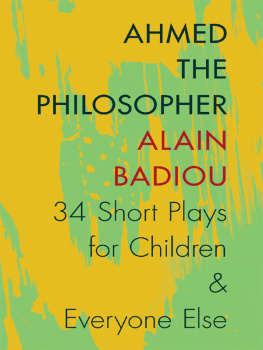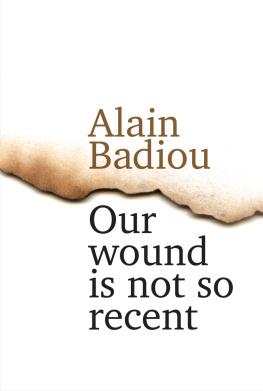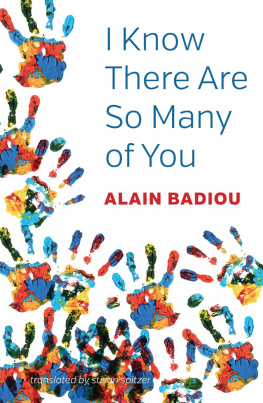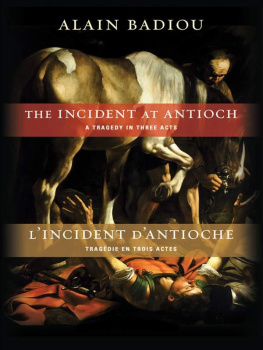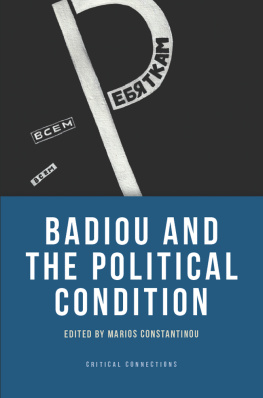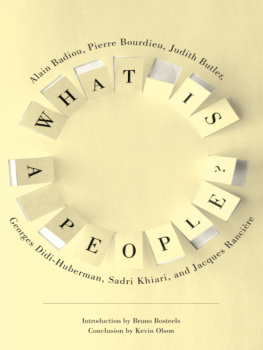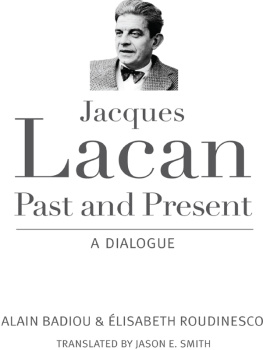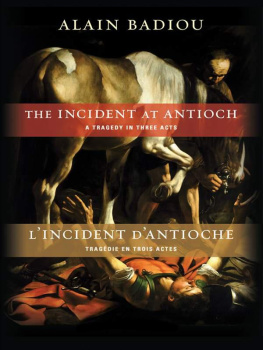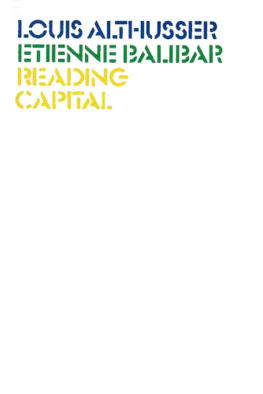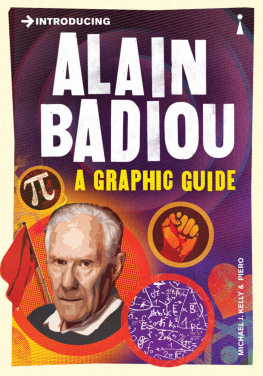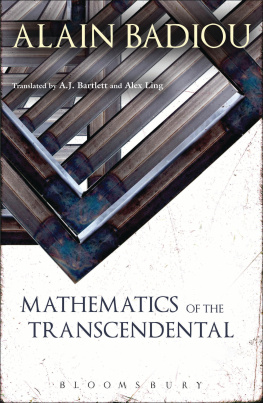Ahmed the Philosopher
AHMED THE PHILOSOPHER
Thirty-Four Short Plays for Children & Everyone Else
Alain Badiou
Translated and with an Introduction by
Joseph Litvak
COLUMBIA UNIVERSITY PRESS / NEW YORK
Columbia University Press
Publishers Since 1893
New York Chichester, West Sussex
cup.columbia.edu
Copyright 2014 Columbia University Press
All rights reserved
E-ISBN 978-0-231-53658-5
Library of Congress Cataloging-in-Publication Data
Badiou, Alain.
[Ahmed philosophe. English.]
Ahmed the philosopher: thirty-four short plays for children and everyone else / Alain Badiou; translated and with an introduction by Joseph Litvak.
pages cm.
Includes bibliographical references and index.
ISBN 978-0-231-16692-8 (cloth: alk. paper) ISBN 978-0-231-16693-5 (pbk.: alk. paper) ISBN 978-0-231-53658-5 (e-book: alk. paper)
I. Litvak, Joseph, translator. II. Title.
PQ2662.A323A7513 2013
842.914dc23 2013035269
A Columbia University Press E-book.
CUP would be pleased to hear about your reading experience with this e-book at .
Cover & interior design by Martin N. Hinze
References to Web sites (URLs) were accurate at the time of writing. Neither the author nor Columbia University Press is responsible for URLs that may have expired or changed since the manuscript was prepared.
CONTENTS
I created the character of Ahmed, an Algerian who had been living in France for a very long time, in 1984, during the summer. I was outraged by the behavior of many Frenchmen who were attacking workers of foreign origin and their families in brutal, stupid, and, not to mince words, racist ways. A number of very young people had been targeted by snipers hiding behind their windows, on the pretext that they were making noise! It was clear that for these child-hunters, the life of an Arab wasnt worth much. I was also outraged by the position of the state and of almost all of the political parties. No, the sinister Le Pen was by no means alone here. The prime minister himself, a socialist named by President Mitterrand, had said apropos of immigration that Le Pen was raising some legitimate concerns. Insidious laws were being readied to make life even more difficult for those workers who had the hardest jobs, who earned the least amount of money, and who lived in the most impoverished areas of the large cities.
Sometimes, in order to express a revolt, laughter is a good method. Suddenly, I had the idea to transpose to the outskirts of a contemporary big city the characters and the events of a very well-known Molire play, Les Fourberies de Scapin (The Trickeries of Scapin). This is a great tradition of the comic theater: the hero is usually a representative of the lowest class. Comedy reveals the world of the rich and the powerful from the violent, ironic, and critical perspective of the oppressed and the poor. The hero of Plautuss Latin plays is always a slave, that of Molires comedies is a valet. My hero would be Ahmed, the immigrant worker of our housing projects.
And so, in a few weeks, my first comedy, Ahmed le subtil (Ahmed the Subtle), was written. The great director Antoine Vitez did an astonishing reading of it, in 1987, at the Thtre National de Chaillot in Paris. The young director of the Thtre de Rheims, Christian Schiaretti, staged it superbly for the Festival of Avignon in 1994. I followed the work of the Rheims actors passionately, and I had long and lively discussions with Christian Schiaretti. We decided to continue our work together. It was thus that, between 1994 and 1996, I wrote for Schiarettis troupe, in whose activity I had become directly involved, three other plays in which Ahmed was the central character: Ahmed philosophe (Ahmed the Philosopher), Ahmed se fche (Ahmed Gets Angry), and Les Citrouilles (The Pumpkins). This entire theatrical episode has stayed with me as an enchanted memory.
Ahmed the Philosopher was born from an idea of Schiarettis: to do in theatrical form short philosophy lessons for children. The final result, whose English translation you are about to read, is composed of thirty-four sketches, each of which has as its title a classic philosophical concept. We therefore find Chance, Nothing, Contradiction, God, the Event, Language, Repetition, Death, Dialectics, the Subject, the Big and the Little, Morality, Time, Nature, etc. Sometimes the form is a monologue by Ahmed, drawing a lesson from one of his adventures. It can also be a dialogue between Ahmed and another character to whom Ahmed will teach a lesson. This other character is usually taken from Ahmed the Subtle: the stupid racist, Moustache; the bourgeois congresswoman, Madame Pompestan; the gabby and pretentious intellectual, Rhubarb; a young hooligan from the housing project, Camille; a young black woman, Fenda. Two others of these characters appear for the first time in Ahmed the Philosopher: an old Arab woman, Fatima, Ahmeds mother; and the Demon of the Cities, a rancid old French informer. Only three of the sketches include three characters, Ahmed and his two understudies (the character of Ahmeds understudy also appears in Ahmed Gets Angry and The Pumpkins). Only one sketch brings together almost the entire cast: Ahmed, Moustache, Madame Pompestan, Rhubarb, and Fenda. This is the sketch that asks the crucial question: what is philosophy?
The work of Schiaretti and the actors of the Rheims company truly gave this ensemble the vitality of a popular theater, an itinerant theater, a theater for everyone. In several French cities there were performances for children, which had considerable success: the children intervened, asked questions, elaborated on the improvisations of Ahmedthe remarkable Didier Galas behind the magnificent mask designed by Erhard Stiefel. But all audiences have always given Ahmed the Philosopher a warm welcome.
Since then, moreover, numerous troupes have performed this or that selection from Ahmed the Philosophers thirty-four scenes. And again, just recently, the director Grgoire Ingold has toured France with a wonderful spectacle, very different from the original version.
The subject of these plays is in reality the power of thinking that resides in the people and their encounter with the materials of philosophy. It is also the ability of the people to invent a language not only to describe their living conditions but also to draw lessons from them, to think the content of their experience in a simultaneously very concrete and very abstract way, a very universal way. And of course, in these philosophical lessons there is the ridicule of the powerful, the weakness of their language, the empty vanity resulting from their positions of power. There is the scathing mockery that strikes at the ideological bloviation of a large number of intellectuals committed to the defense of the established order.
I am really delighted that all this has been rendered in English thanks to the surprising innovations of Joe Litvak. It wasnt easy: the language of Ahmed the Philosopher combines contemporary popular style and philosophical jargon in a way that is at once funny and disorienting. It is very much embedded in the idiomatic character of French, between the phrasings of classic theater and the brutalities of the language of today. What Joe Litvak had to do, almost sentence by sentence, was come up with English equivalents, based on a profound understanding of the meaning of the lines and of the acting style that can do justice to them. So well does this succeed that often I myself laugh harder reading the English text than reading the original that I wrote!

